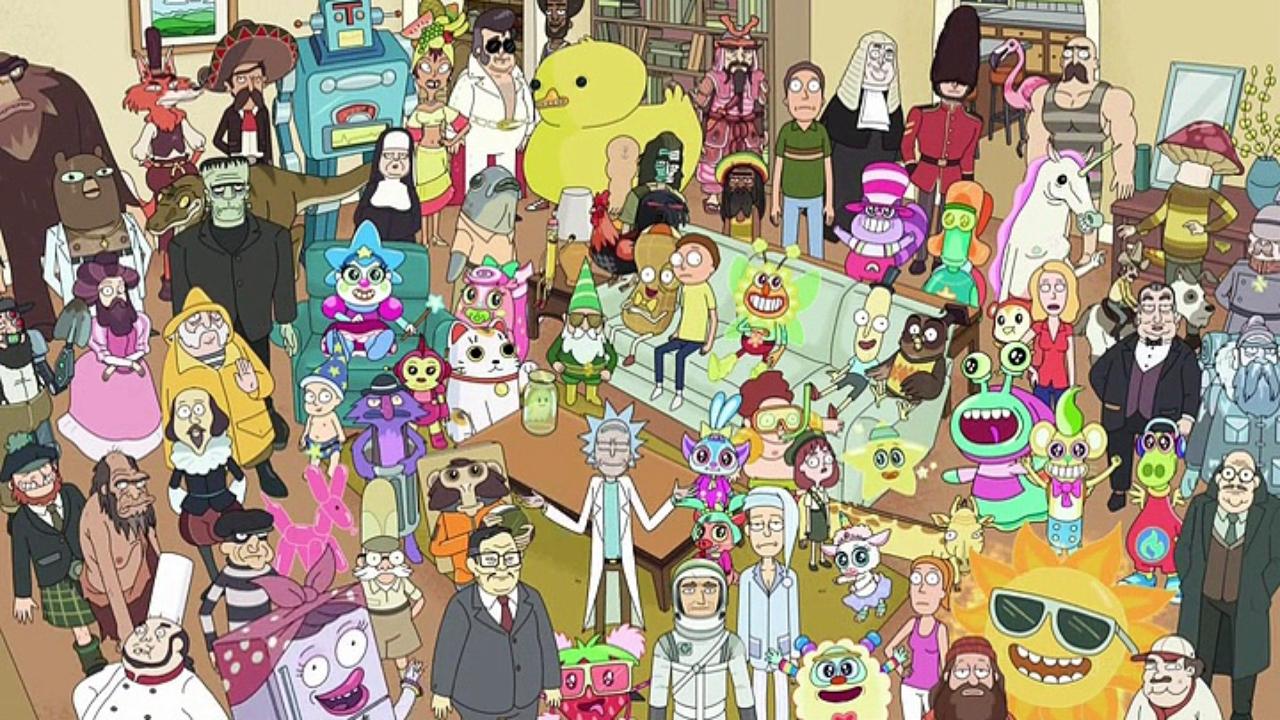(The following review contains spoilers for Rick and Morty, if such things exist)
It’s rare to see a show hit the ground running in quite the way Adult Swim’s Rick and Morty did. While ostensibly a spoof of the Doc-Marty Back of the Future relationship, the series quickly outgrew its premise. Creators Justin Roiland and Dan Harmon began with a solid proof-of-concept pilot, but delivered a true classic episode of television in their second outing, “Lawnmower Dog.” From there, they grew bolder and bolder, wiping out the entire town and bringing the characters into a parallel universe in “Rick Potion #9.” They further emphasized the existence of infinite universes with “Rixty Minutes,” involving a cable box with channels from alternate realities, and “Close Rick-counters of the Rick Kind,” in which a whole society of Ricks and Morties from other universes were revealed.
Moving into season two, it was hard to know what to expect. Given the expansion of the mythology as the first season moved on, one could have predicted that season two would delve deeper into the multi-verse, emphasizing a more serialized method of storytelling. But Rick and Morty had never been predictable, and Roiland and Harmon instead stuck to just the primary universe this time around, focusing on developing the Smiths (Morty’s family) into a cohesive family unit and creating conflicts within our own space-time continuum.
The result is a season which is neither better than its inaugural season, nor especially worse. Beth, Jerry, and Summer are much more frequently brought into Rick and Morty’s sci-fi adventures this time around, and while they received development in season one, their higher concept plotlines this time around allow the writers to expose them in ways that just weren’t possible last year. Take, for instance, “Big Trouble in Little Sanchez,” in which Beth and Jerry go to an alien couple’s therapy retreat. Here, their perceptions of each other are made manifest in the forms of alien beings: Beth as a variation on the Queen Alien from the film Aliens, and Jerry as a useless slug. But it’s the creatures’ co-dependence which proves most dangerous to everything around them, brilliantly detailing the characters’ relationship in a way that could otherwise be difficult to portray.
The season’s tendency to expand inward rather than outward does not mean that it is any less ambitious than its first season. One particularly clever episode, called “Total Rickall” involves alien parasites which disguise themselves as wacky characters. They stay hidden in plain sight by implanting memories in people’s minds to convince their victims that they’ve always been there. The amount of work that the animators must have gone through, creating hundreds of completely new and conceptually-bizarre characters, is hard to even fathom. On a less technical level, the episode also brilliantly uses the concept to reinforce the central characters’ relationships. The inspired twist that the aliens can only create positive memories picks at the very nature human memory and interaction, and the fate of the absurdly-named Mr. Poopybutthole takes that very concept to a brand new, wholly unexpected place.
The character-centric focus also frees the show to take a more episodic story approach. Without the burden of heavy continuity, we can take a half hour for the hilarious episode “The Ricks Must Be Crazy,” in which Rick and Morty continually enter themselves into “micro-verses,” all of which are used as batteries for the universe they exist inside of. Or, an episode can exist as a more overt showcase of a character’s history and motivation, the way that “Auto Erotic Assimilation” does with Rick. The season definitely loses an element present in the building narrative of season one, but in its place is a continuing clarification of character that will help serve the show in the future. It also remains really fucking funny, which is perhaps the only element the show absolutely needs to remain a hit.
The two episodes that seem especially interested in continuity are the premiere, which picks up directly after the finale of season one, and the finale, which brings back the character of Bird Person and sets up a new plotline regarding Rick’s status as an intergalactic fugitive. Unlike the first season, this year ends with a fairly serious cliffhanger, which the show takes quite seriously. The sequence is scored with Nine Inch Nails’ “Hurt,” a decision which initially struck me as jokey but resonated surprisingly well with the situation at hand. Rick’s decision to turn himself in to the authorities is a significant character choice, and one that has been building quietly in the background throughout the series. If there’s one reason to be upset with season two of Rick and Morty, it’s that we’ll have to wait another year and a half to see what happens next.
